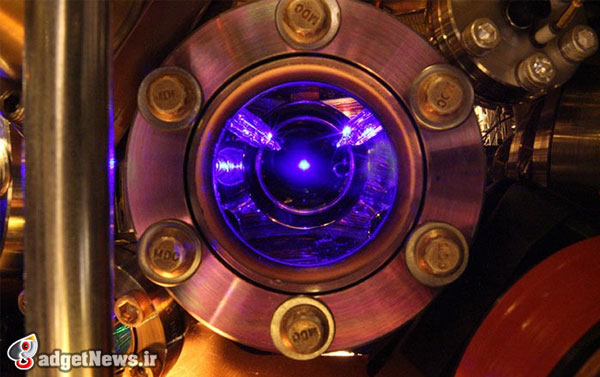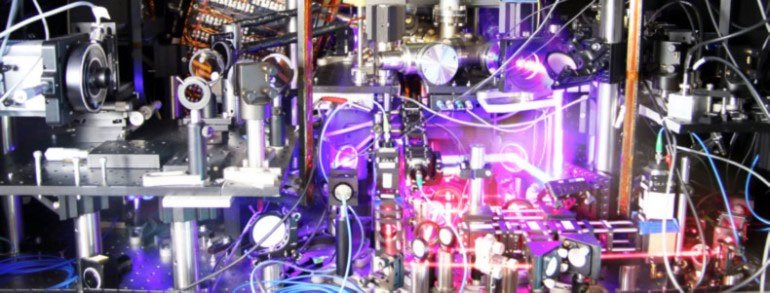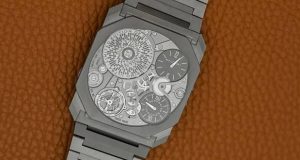
دانشمندان دانشگاه کلرادو موفق به ساخت ساعتی شدند که دقیق ترین ساعت دنیا تا به این لحظه به حساب می آید. این ساعت که JILA Stronium Atomic نام دارد، آنقدر دقیق می باشد که تنها ممکن است در طول هر ۵ میلیارد سال تنها ۱ ثانیه به عقب یا جلو رود. در واقع دقت آن در هر ۵ میلیارد سال تنها ۱ ثانیه است.

میلیارد سال حتی بیش از عمر کره زمین می باشد که چیزی در حدود ۴.۵ میلیارد سال عمر دارد. تیم تحقیقاتی و سازنده ای این ساعت اعلام کرده که باز هم بدنبال دقیق تر کردن این ساعت یا ساعتی جدید خواهند بود و طی ۵ تا ۱۰ سال آینده ساعتی جدید با رکوردی جدیدتر معرفی خواهند کرد. نکته جالب دیگر در مورد این ساعت این است که هر ثانیه برروی این ساعت، ۴۳۰.۰۰۰.۰۰۰.۰۰۰.۰۰۰ یا ۴۳۰ تریلیون تیک یا بخش می باشد.
منبع : gizmag
World's most precise clock only loses a second every five billion years
Not satisfied with the accuracy of the "quantum logic clock" (which only gains or loses one second every 3.7 billion years), the National Institute of Standards and Technology (NIST) and JILA have unveiled an even more precise timekeeper. The strontium lattice clock sets new standards for precision and stability, only gaining or losing one second about every five billion years.
Atomic clock performance can be measured by two key metrics. The first is stability, which is how much its speed varies and therefore is a determining factor in how long the clock needs to run to achieve its best performance through continual averaging. The second is precision, which is how closely the clock approaches the true resonant frequency at which its reference atoms oscillate between two energy levels.
NIST says the stability of the new strontium lattice clock is roughly the same as NIST's ytterbium atomic clock unveiled last year. Both are so stable that it takes only a few seconds of averaging to outperform other types of atomic clocks that have been averaged for hours or days. However, NIST says the new clock is about 50 percent more precise than the previous record holder in terms of precision, its quantum logic clock, making it the first clock to hold both the stability and precision records since cesium fountain atomic clocks were introduced in the 1990s.
Although the new strontium clock is more precise, by definition, no clocks can be more accurate than cesium-based clocks. This is because they are still used for the international definition of units of time – the NIST-F1 cesium fountain clock, for example, is the current US civilian time standard clock. However, NIST says the strontium lattice and other experimental clocks may one day assume the mantle of timekeeping standard.
The JILA strontium lattice clock is an optical atomic clock that holds a few thousand neutral strontium atoms in an optical lattice of laser beams. The "ticks" of the strontium atoms, which occur 430 trillion times a second, are detected by bathing them in red laser light at a precise frequency that triggers a switch between energy levels.
Unlike atomic clocks that have only a single ion that flips back and forth between quantum states, the quantum fluctuations of the thousands of atoms in the strontium clock can be averaged out during a single measurement of clock ticks, therefore offering the same accuracy and reproducibility in less time.
For the time being, the strontium lattice clock lays claim to being the most precise and stable timekeeper on the planet, but the clock is no doubt ticking on the appearance of a clock that will knock it off its perch.
 گجت نیوز آخرین اخبار گجتی و فناوری های روز دنیا
گجت نیوز آخرین اخبار گجتی و فناوری های روز دنیا 





